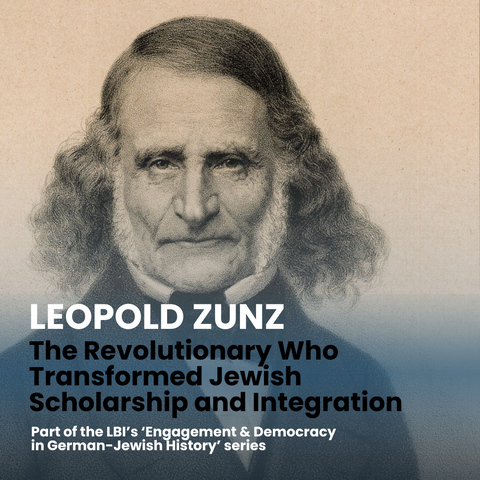
Leopold Zunz (1794–1886) was a pioneering historian and religious scholar who fundamentally changed how Judaism was understood and studied. The Leo Baeck Institute spoke to Dr. Rachel Livne Freudenthal, a historian and expert in Jewish studies. Dr. Livne Freudenthal works at the Leo Baeck Institute in Jerusalem and has published extensively on Jewish history, including works such as The Verein: Pioneers of the Science of Judaism in Germany (in Hebrew) and contributions to Jews in Berlin 1671–1945.
As a founder of the modern ‘Science of Judaism’ (Wissenschaft des Judentums), Leopold Zunz argued that Judaism was not only a religion or nation but a rich culture deserving systematic academic exploration. His work helped lay the foundations for Jewish emancipation and integration into European society, advocating for Jews to be seen as full citizens and world citizens.
Born into modest circumstances, Zunz lost his father young and became the first Jewish boy to attend a German grammar school. He came of age during a period of hope and disappointment for Jews in Prussia, witnessing both the promise of emancipation and the backlash of political restoration. Inspired by the ideals of the French Revolution, he believed that true freedom for Jews would only come through broader societal change and revolution, not gradual reform alone.
Zunz was a key figure in the Verein für Cultur und Wissenschaft der Juden, a society that sought to redefine Judaism as a culture and promote its study through scholarly methods. He insisted that Jewish culture, as reflected in its literature and traditions, should be studied scientifically and presented as part of enlightened world culture. This approach sparked controversy, as it challenged both religious traditionalists and emerging nationalist movements.
Though Zunz briefly served as a preacher in a Reform congregation, he remained critical of both religious orthodoxy and certain aspects of Reform, always prioritising the integration and equal rights of Jews within the broader society. His legacy endures as a revolutionary thinker who connected the Jewish quest for equality with the universal ideals of justice, freedom, and rigorous scholarship.
We encourage readers to explore the full English feature, an interview with Dr. Rachel Livne Freudenthal, for a deeper understanding of Heller’s life and ideas: https://www.lbilondon.ac.uk/research/engagement-democracy/leopold-zunz-revolutionary-judaism. The article is part of the series ‘Civil Engagement and Democracy in German History: Jewish Experiences and Perspectives’.
For more on the Leo Baeck Institute’s anniversary events and new archival collections, visit the LBI’s 70th anniversary website: https://lbi-70.org
You can also read more about Leopold Zunz in the book Jude, Deutscher, Europaer which is part of LBI London’s Schriftenreihe Series: https://www.lbilondon.ac.uk/books/schriftenreihe/jude-deutscher-europaer



